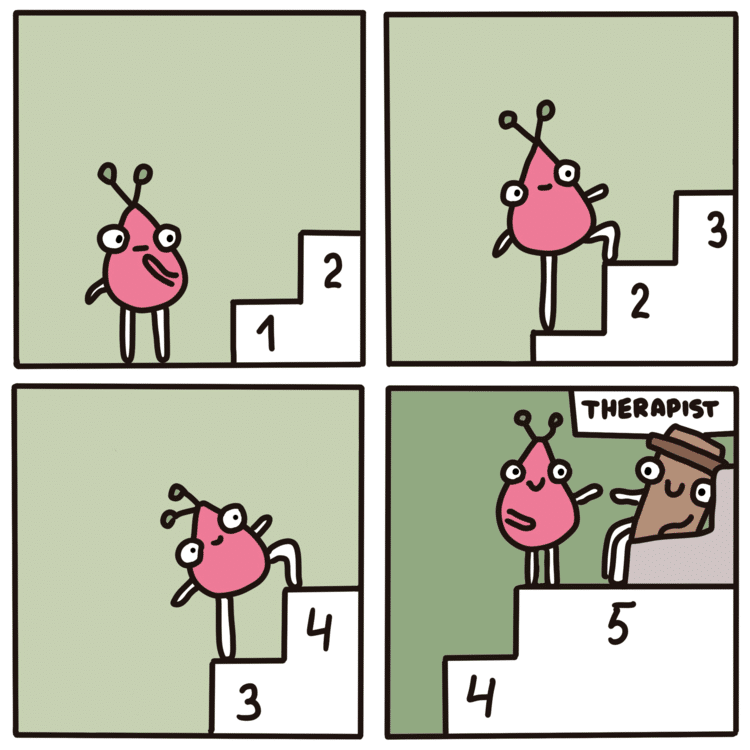Table of Contents
With cultural norms shifting to place greater emphasis on mental health, therapy is becoming more and more mainstream for people looking for a way to overcome these challenges. But finding the right therapist is not always easy, especially in Singapore where there is little in the way of quality standards governing this profession.
To address this, we’ve put together an effective five step process you can follow to find the right therapist for your unique situation – what you need to know and what you need to look out for.

Step 1: Educate yourself and set realistic expectations
Seeking the help and guidance from a professional therapist is one of the most courageous decisions you can make for your mental health. And while taking this first step is one of the most important, there are several acts of diligence you should perform before engaging with a therapist.

Psychotherapy is an extensive field with numerous disciplines, techniques, and approaches. Each will have its own strategies to help patients through mental issues. Some options will work better for your unique circumstances than others so before you start phoning up all the reputable offices in your region, you should take the time to educate yourself on the different practices and set realistic expectations for treatment.
Be open and honest with yourself about the way you are feeling and why you have decided to seek the help of a therapist.
Are you feeling depressed?
Do you feel lost and not in control of your life?
Are you experiencing difficulties with your relationships?
Take some time to learn about the various disciplines of therapy. You’ll find that many help with the same issues. But the ethos of each will offer different methods and techniques.
In psychiatry, for example, the focus is on how your biology contributes to your mental state and how disorders are caused by imbalances in neurological processes. Treatment typically involves the use of medication.
In cognitive behavioral therapy, the focus is on changing one’s thoughts, beliefs, and attitudes to encourage a more positive path. Treatment typically involves in-depth interaction with the therapist and implementing various coping strategies and emotional regulation.
Therapy is a very intimate experience where you put your trust in a complete stranger who you hope will help guide you to a better mental state. So equip yourself with as much knowledge as possible.

Step 2: Research potential candidates
Once you have familiarized yourself with all of the different types of therapy, it’s time to research some potential candidates to be your therapist.
The easiest way to start is by doing a quick search online using your favorite search engine. Any therapist worth your time will have a professional website online that clearly states information about their services, techniques, educational and training background, etc. Cross-reference this information with the expectations you’ve established in step one to determine if a therapist looks like a good fit. Pay very close attention to their specializations and areas of expertise. Most therapist have areas where they have extensive training or experience in. You’ll want to find one who is specifically knowledgeable in the area that affects you in order to get the most out of your treatment.
Online reviews can also be a good resource but should be used only for reference rather than a decision tool. Therapy is such a subjective experience, unique to the individual. The reasons why one person may or may not have liked a specific therapist may not ring true for you, so do not let the opinions of others guide your decision. That being said, online reviews are a great way to uncover potential red flags from a therapist – like if they are constantly checking their watch for time or have a habit of interrupting patients.
Here are some other points to look out for when researching potential therapists:
● Where the office is located? Is it going to be convenient for you to get to?
● What is the cost of the services? If you are worried that you won’t be able to afford therapy, there are many programs offered for Singaporeans and PRs such as the Counselling Fee Subsidy Scheme. This program gives people who earn less than $10,000/year rates as low as $40 per hour. Check the website of potential therapists for any mention of such programs
● Will you be more comfortable with a therapist of a certain gender?
Once you’ve found some potential candidates in your area, you can always give their office a quick call or send them some questions over email. Many therapists will provide free phone screenings where you can ask your most important questions without having to visit the office. You’ll be able to ask about their background, the specific issues you’re struggling with, and what your goals are for therapy. A good therapist will want to use their skills and experience to help you as much as possible so they won’t hesitate to take a few minutes to see if there will be a good fit. This is a great way to feel out the therapist over a quick 15 minutes chat before committing to any appointments or in-person meeting.

Step 3 – Interview candidates
Yes, it is okay to meet with a therapist with no expectation to sign on as a patient. Many therapists will agree that finding the right fit is critical for any healthy therapist-patient relationship. You may come across therapists who may discourage any notion of an interview and may pressure you to sign on right away as a patient. This is a pretty good indicator that you should not go with this therapist.
Many therapists include a lot of information on their websites, so an in-person interview is a great way to dive deeper into topics that are particularly important to you. A therapist should be able to confidently discuss specific methodologies and research that they follow and any of the special techniques they utilize in their treatment.
Here are some useful questions to ask during an interview with a potential therapist:
● Are you a licensed therapist?
● How many years have you been working as a therapist?
● What is your educational background?
● Tell me about your training
● How does the type of intervention in which you specialize, work?
● How long can I expect treatment to take?
● How will I know if treatment is effective?
● What is the cost structure for your services?
One thing to be conscious of during these interviews is to keep an open mind. There are many different approaches to therapy, each with extensive research in support of their efficacy. Listen to what each therapist has to say regarding their practice and plans for treatment. Don’t be afraid to respond directly and honestly about any concerns or reservations you have about their approach. At the end of the day, therapy only works when there is mutual understanding and commitment to the relationship. If you do not get a sense of that during the interview, do not be afraid to move on.

Step 4: Attend 1-2 appointments and then reflect
After conducting interviews with therapists and deciding on one to proceed with, attend a couple of sessions with that therapist. You won’t really know what you like or dislike in a therapist until you experience an actual session.
Successful therapists will show a lot of compassion and have a good ability to listen in a non-judgmental way. But each will bring their own unique style and personality that may or may not fit your own. Some therapists will be better at listening. Some will be better at offering advice and teaching you different techniques and skills.
After your first couple of sessions, you should reflect on your experience and let your feelings guide you to decide whether you wish to continue with this therapist.
Do you feel heard?
Do you feel like you can be open and honest?
Are you being given honest feedback that you can act on to improve your condition?
Is your therapist fully engaged during your session? Or are they constantly shifting their attention to their phone or computer?
By the end of the first or second session, you and your therapist should also have established a treatment plan with agreed upon goals. Your therapist should also provide strategies aimed at helping you to reach your goals, as well as a timeline on how you long you can expect treatment to last.
Finally, pay close attention to the advice given to you by your therapist. If you are unsure of how their advice applies to your situation, don’t be afraid to ask and clarify. Some therapists take advantage of the vulnerability of patients for financial gain – such as convincing you to buy their book. So think critically during your interactions with your therapist and never do something you’re not comfortable with.

Step 5: Move on, if necessary
Therapy is not an overnight process. You cannot expect to see meaningful change after a single session. Therapy is a marathon that adds incremental improvements that will ultimately lead to big overall change.
So when should you be able to see the first incremental change? Everyone approaches therapy at different paces so each person’s experience will be different. But in general, if you haven’t noticed any semblance of improvement within a few weeks, you may want to consider moving on to another therapist.
In addition to your progress or lack thereof, there are other signals you can look out for that can also give you clues that you should move on (ones that you can notice much sooner).

Some indicators include:
Lack of attention
Does your therapist just nod his or her head nonchalantly at everything you say? And when they do speak, do they just offer vague and non-sensical phrases like, “I see” or “How does that make you feel?”
If so, these are signs of a disengaged therapist and you are best to end the relationship as soon as possible.
Self-indulging tendencies
A therapist’s job is to observe you, analyze your behavior, and provide meaningful advice and strategies to help you overcome your mental challenges. If you find that your therapist talks more than you or is constantly interrupting you, it’s clear that they are more concerned with what they have to say than actually seeking to better understand your situation.
Inappropriate behavior
Your relationship with your therapist needs to have a solid foundation of trust and mutual respect. If your therapist violates this in any way, either through inappropriate sexual advances or breaching confidentiality, move on as soon as possible. Depending on the situation, filing a complaint against the therapist may also be a good idea.

Conclusion
Therapy is one of the most vulnerable experiences you can have. It can be a long journey that ends only when you feel confident that you have the skills and mindset to overcome the challenges that made you seek therapy in the first place. Research everything you can, meet with different therapists, and don’t be afraid to adjust until you find one that is best suited to help you achieve your desired outcome.
Calvin is a technology professional, blogger, and writer, covering topics in self-improvement, productivity, and health and wellness. He is passionate about the craft and using the right collection of words to fully express the ideas and vision for individuals and businesses.



